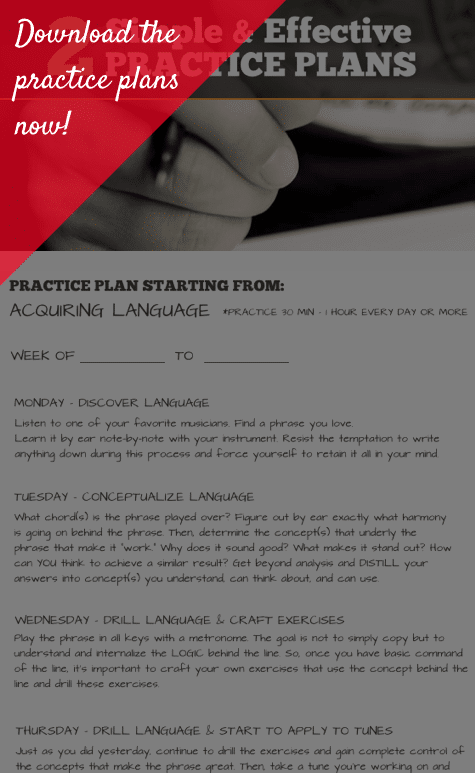There seems like there’s so much to practice, but it’s actually an illusion. In today’s day and age, we’re bombarded by information. In approaching or learning literally anything, there’s a million resources for how to achieve it. Looking for the perfect way to slice an apple, or the best diet to get a six-pack? A simple stroll of the internet will give you more information then you know what to do with, and that’s exactly the problem.
More information is not necessarily better.
You see, before the books and the DVDS and the countless play-alongs, musicians learned by studying the music they loved. Of course they had a couple technical books and a strong understanding of harmony, but they weren’t drowning in a sea of practice topics to choose from.
This feeling of drowning that’s so familiar to us all, is exactly what this reader expresses:
“I feel like there’s so much to practice, arpeggios, scales, transcription, learning tunes, walking bass lines, working on time, and the list goes on. I find my self trying to work on everything in one day but each thing gets half-assed.
Is it okay to pick different things to work on each day? I always thought that you should do as much as possible in one day but that obviously can’t be the case.”
Even when you know what to practice, it can still be a mystery of how to structure your time. And that’s why today, we introduce two simple and effective practice plans that will help you to architect your practice time.
Creating a weekly practice plan
We previously released a huge presentation on what to practice and shortly after, shared a diagram of how to practice. Now we’ll take a closer look at how you might architect your time into a weekly practice plan.
Using the concepts presented in those previous lessons, we’ve put together two concise practice plans that will help you learn how to put everything into practice. Keep in mind:
- Practicing daily for 30 minutes to an hour for 5 days in a row is better than 1 day of elongated practice. Consistency is king!
- Think in terms of weekly goals and time blocks. You don’t need to tackle everything in one day. The goal is to build upon what you learned yesterday.
- Focus, Focus, Focus! No cell phone, no email, no Facebook. Just you and a dedicated hour.
- Aim to master or improve on one thing a day rather than touch the surface on several.
Download the Free Practice Plans:
Use these two plans to structure your daily time and to formulate your own practice plan. With a little thought and using these plans as your model, you’ll be well on your way to forming consistent, productive, and rewarding practice habits.











